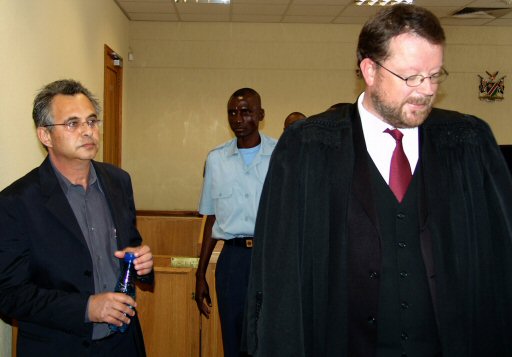
Fugitive businessman Kobi Alexander to return to US to stand trial
The founder and former CEO of the Israeli-American company Comverse Technology, Kobi Alexander escaped to Namibia in 2006 ahead of being indicted on charges of fraud; Alexander is expected to appear before a New York judge and admit to a lesser charge; as a result of the fraud coming to light, nearly 2,000 hi-tech companies were discovered to have been involved in 'backdating'—changing the date a stock options was offered to its employees to allow them to buy the stock at a lower price.
Israeli-American businessman and former Comverse CEO Kobi Alexander, who has been living in Namibia for the past decade, announced his return to the US, to face criminal charges, according to reports by CNBC.
The statement was made by Alexander's attorney, Benjamin Brafman, following two years of hushed negotiations between the US Department of Justice, Brafman and Namibian authorities, during which attempts made by the US to get him extradited were repeatedly thwarted.
Ten years ago, when the scandal broke over Comverse's "backdating"—changing the date a stock option was made available to its employees and thereby making it possible to buy more at a lower price—Alexander had managed to evade standing trial by fleeing to Namibia, which does not have an extradition agreement with the US. According to his settlement with the US Prosecution, Alexander is will plead guilty at the beginning of his trial next week.
Brafman said his client will appear before a federal judge in Brooklyn, New York, to stand trial at what will be one of the last remaining criminal Dot-Com cases of the early 21st century. Brafman added that Alexander will be admitting to only one charge, as opposed to the 35 charges that were included in the original indictment.
In addition to "backdating," the original indictment also accused Alexander of laundering millions of dollars through private Israeli accounts, bribery and obstruction of justice due to his attempt to convince his deputy CFO to take the blame. As stated, all of these counts were removed from the current indictment.
Before the scandal broke, Comverse was very well-regarded as a pioneer in the field of audio message technology. During the early '00s, the company was the darling of Wall Street and the first Israeli company to be included in the NASDAQ 100 and S&P 500, two stock indexes that measure the largest publicly traded companies in the US. All of this ended, though, when Comverse found itself the target of a federal investigation; while two of its other top managers confessed and were put on trial, and close to 2,000 companies were found to be involved in backdating, Alexander was able to escape the country just in time.
Despite entering Namibia under dubious circumstances, Alexander has since used his fortune to improve the lives of those living in the country: in the years since he came to Namibia, he has invested millions of dollars in improving the local schools and in projects aiming to improve the housing situation in the country's most struggling cities. Together with his wife, he founded two soup kitchens that provide food for hundreds of children on a daily basis.
Alexander also attempted to make amends with the company he helped start. During his stay in Namibia, he agreed to pay $60 million to Comverse and to forgo the $72 million's worth of severance pay.
In 2010, Alexander managed to come to an agreement with the US Securities and Exchange Commission, under which he paid back $53 million, in what was one of the most expensive backdating settlements ever reached. The Prosecution's Office, though, was not done with Alexander, and continued to wait in vain for him to be extradited back to the US.
While the details of Alexander's return and admittance of guilt have been predetermined, it will up to the presiding judge to decide the extent of his punishment, as both sides await to see how his trial will unfold.
















